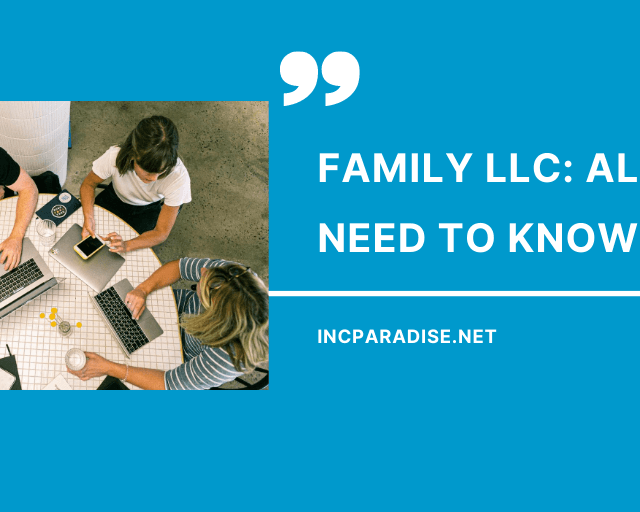Having a family business is an integral part of American history and commerce. As a matter of fact, about 90% of American businesses are family-owned. Since families and businesses have different purposes, it should not come as a surprise that certain business entities offer greater protection to family-owned enterprises. And from all the available business entities available, the most commonly used one is the Family LLC.

We all know that LLCs offer many benefits. And when we add family to that, the benefits just increase. So, if you are thinking about opening a business with your family, this might be the best business entity choice for you. Not sure how Family LLC is a good choice? Keep reading to know all about the Family LLC business entity and additional details like the family LLC operating agreement.
Family LLC
A family limited liability company (LLC) is formed by family members to conduct business in states that allow LLCs. In a Family LLC, the members have to be related by marriage or blood. This business entity type is known as a popular way to protect the assets of a family business against claims by creditors, assist in estate planning, and divide income among generations. It is a type of closed corporation.
Just to be clear, the Family LLC is formed by one family member who serves as the managing member. This organization is ruled and operated by a Family LLC operating agreement. The family LLC operating agreement defines and restricts rights related to ownership, transfer of assets, and functional decision making. A family LLC can be formed even for legal business purposes, such as brokerage account management or real estate. Nevertheless, a family LLC cannot be used to manage a personal residence.
Benefits of starting family LLC
With that said, it is important to know that a family-owned business offers a ton of benefits you won’t find anywhere else. Some of these great benefits include:
- Increased comfort and familiarity
- More personal stakes in company success
- Tax breaks for hiring underage family members
- Greater long-term employee retention
- More reliable work performance
- Save time and money on recruitment
Don’t they sound the same as the benefits offered by an LLC?
So, what is the difference between family LLC and regular LLC?
Well, when talking about family LLC vs LLC, a Family LLC usually owns brokerage companies, rental properties, and a portion or all of the family’s business operations. On the contrary, an LLC can own anything. It just cannot own any personal residence as it violates its tax status. In short, there is just one main difference. But this is what makes the Family LLC much more convenient when you are about to open a business with your family or a family member.
Pros and cons of a Family LLC
Now let us talk a bit about the pros and cons of the Family LLC and understand it better. Beginning with the pros, forming an FLLC provides a lot of advantages to the partners, owners, and members. Family LLC benefits include:
- Owners retain control over assets. Senior managers or owners might use annual gift tax exclusion to avoid paying gift tax when transferring business interests to limited partners.
- Distribution of the business interests freezes their value and removes appreciation from the future estate of the owner.
- The business value of the FLLC members’ interest is lowered due to the lack of participation in management.
- An FLLC is a pass-through entity for income tax purposes. The FLLC income passes to partners, who report the income tax and pay any tax that is owed. Minimizes federal gift and estate taxes.
- Easier transfer of the family business to the next generation.
And just like there are positives of having a Family LLC, there are also negatives to using an FLLC. They include:
- An FLLP or FLLC is probably not the best way to transfer assets to minors.
- The general partners or managers of an FLP are vulnerable to some risk.
- Limited partners (typically the children of the owners) may be exposed to future capital gains liability.
- Owners must be careful to put only business assets into their FLLC. Don’t commingle business and personal assets.
- The FLLC must meet IRS requirements or risk being considered something other than an FLLP or FLLC. There may be tax consequences if the FLLC seems to have been formed only to avoid paying taxes.

Family LLC Operating Agreement
Now that you know all about the Family LLC, let us talk about the document that governs the way the LLC operates. In fact, it covers the topics including how the company will be funded, who will be the manager, and how to allocate and transfer ownership interests.
A carefully crafted operating agreement is even more important for family LLCs because they tend to attract closer scrutiny to ensure that the entity and individuals who own it are separate—that they are not merely tax shelters. The operating agreement can help demonstrate that the company is a separate, independent entity and that its owners, the family members, do not use it as a tax evasion tool.
Asset protection
A family LLC is a useful tool to shield family assets from creditors’ claims. Each member’s financial contribution limits his or her debt liability for the LLC. Members may be prohibited by the operating agreement from withdrawing and then reacquiring their interests in the company that can be later claimed by creditors.
Other restrictions, such as an absence of certain members’ rights to vote or oust the management, limit the ability of creditors to interfere with LLC operations, and seize the LLC’s assets.
Types of restriction in an operating agreement
The types of restrictions in an operating agreement include:
- Members are not allowed to withdraw or reacquire contributions from the company which creditors can seize.
- Members are prohibited from management activities or terminating the appointment of the management team.
- Members are not allowed to attempt a split or dissolution of the company without the approval of the entire management and ownership of the company.
This will make it difficult for a creditor with a charging order to interfere with the LLC operations and make it easier to opt for an out of court settlement.
How a Family LLC Should Work?
You have a wide range of family businesses you can start. No matter the nature of your business, you’ll need these best practices to guide you in getting your family-run business off the ground.
File Necessary Paperwork
Depending on the nature of your business, you may need to obtain licenses, permits, or other documents to keep your family LLC in compliance. If this is the case, don’t delay in getting that process started. In many cases, you’ll need these before your LLC can operate legally. Your local county or city office — find out which applies to your company’s base of operations — can answer any questions you might have.
Failure to satisfy your compliance needs can result in a variety of unfortunate consequences. These may include simple penalties such as fines or loss of good standing. But they can also extend to civil or criminal prosecution as well as administrative dissolution.
Make Everything Official
Right from the start, ensure that you have your business structure and processes on paper. File an Operating Agreement to get everyone on the same page. This should cover a detailed description of each employee’s salary, dividend payouts, work commitment, and any other decision-based question that might arise. The last thing you want is for a future business disagreement to tear your company — and, by extension, your family — apart.
Consider including some additional details in your Operating Agreement to keep the company intact or maintain a certain level of management or ownership. For instance, a transfer restriction can ensure members don’t transfer their company interests outside the family. Likewise, a drag-along rights provision allows majority stakeholders to force a minority stakeholder to participate in any future sale of the company.
Treat every member the same
To that end, your business will inevitably need to employ non-family members. Even if you start out with many family members joining your company, it’s bound to happen. But when it does, you need to ensure every employee receives the same treatment. If family members are handled with more care and consideration than other employees, this will only lead to discord.
Some best practices to follow:
- Set forth a plan for how your company sets salaries.
- Create checks and balances to ensure hiring is fair.
- Offer uniform benefits to all company employees.
- Detail the process for advancement opportunities.
- Only hire family members who actively contribute.
Create employee agreements
Combining the previous two points, you should make sure that all of your LLC’s employees have contracts on file. You never know how the relationship with a given employee might turn on you, even if the worker in question is family. So, to avoid any potentially damaging conflicts later on in your company’s lifecycle, every employee in your company should have an agreement stipulating their salary, time commitment, exit strategy, and any other issue that might be unclear.
Keep personal life separate
In case this isn’t clear yet, the goal with your family business is to do everything in your power to keep your personal and business lives separate. That goes for the financial side of things, meaning separate bank accounts and the like. But you should also keep business discussions and concerns out of non-business hours. Blending the two can lead to unrest within your company and make the endeavor feel overwhelming over time.
How does IncParadise help you?
If you are hoping to open your Family LLC in the USA, we can help you with it. IncParadise offers incorporation services and registered agent services in the USA. So, you can easily connect with us and have your Family LLC set up in any state in the country through us. Contact us to know more!






